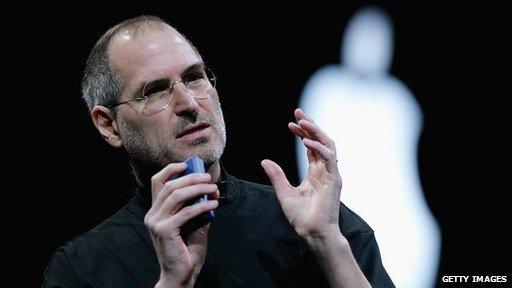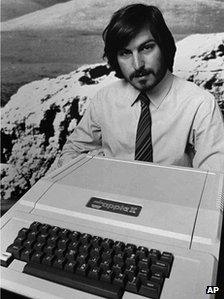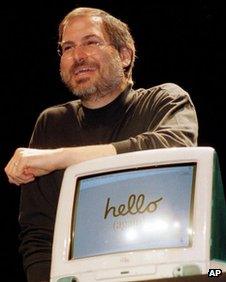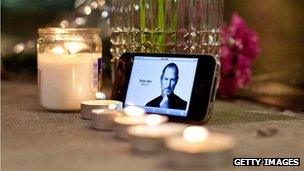Viewpoint: Steve Jobs is missed by Silicon Valley
- Published

Steve Jobs died on 5 October 2011 after a long battle with pancreatic cancer
Steve Jobs is still missed.
You hear it on stages, like when Marc Benioff, chief executive and co-founder of Salesforce, urged 90,000 attendees at the firm's Dreamforce conference to fill in the visionary hole that Steve Jobs left.
You hear it at cocktail parties. At one by Morgenthaler Ventures, for instance, Apple team members who worked on Siri talked about how they missed Steve Jobs yelling at people.
You hear it on the streets. While standing in line for the newest iPhone - which included one of eBay's top search experts, Andy Edmonds - people noted that the industry was a bit more boring without Jobs.
It's a year after Steve Jobs died. So, what has changed?

Steve Jobs, seen here in 1977, helped popularise home computing
We haven't seen a shocking new product or rethink of something that exists, like when the iPhone came out of Steve Jobs' pocket.
Apple press conferences aren't quite as interesting.
The tech press is looking for signs of vision from other companies, including Microsoft.
I hear from Apple team members that working at Apple is a bit easier, but also that they miss the chaos and excitement that Steve Jobs could cause.
Apple has gotten even more profitable, but those profits raise new questions because they were built on top of work that Jobs did. Can Tim Cook capture new markets the way Jobs did?
After Jobs' death last year I wrote that Apple would be fine, external.
I still think it'll be fine. Great companies don't just disappear and Apple is still benefiting from momentum put in place by Jobs and his teams.
What are Apple's still existing advantages?
It has the best supply chain in the business. We see the power of that supply chain this month as the new iPhone has gotten top reviews on sites like gdgt.com.
It has the best design team in the business.
It has the best PR team in the business. At Apple's latest press conference it had six times more satellite trucks outside than when Mark Zuckerberg, founder of Facebook, spoke.
It has the best retail channel in the business.
What is missing now that Jobs is gone?
The salesmanship. He goaded the industry to move to higher things and he convinced us that the future was here and that it was important to pay attention.
His ability to say no and keep things from shipping. Andy Grignon, who worked on the first iPhone, tells me all the time about how Jobs would kill a project or send it back for more work. He tells about how the original iPhone looked nothing like the shipping product. Jobs kept saying "no" until it was perfect.
His ability to get us to appreciate seemingly unimportant details. I still remember when he told me to look at how beautiful the back of an iMac was. Mr Cook tries to pull this off, but it doesn't sound the same coming from him.

The iMac's launch marked the start of Apple's revival after near-bankruptcy
Silicon Valley still hasn't recovered from this loss.
Yeah, it's trying. Larry Page and Sergey Brin over at Google are building self-driving cars and fantastic new wearable computers, but I'm left wondering how Jobs would look at those efforts and find a way to improve them.
Yes, I do wonder if Apple would have released its maps feature in such an early state.
Or, if he had released it, would he have explained to us why he is doing his own maps in a much better way than Mr Cook did. There are good reasons, after all, for Apple to head its own way and build its own mapping technology.
See, Apple and Google are on a collision course around contextual applications and operating systems.
Siri today is a bit stupid. She gives you the same answer she gives me. That's not contextual, or, personalised.
In the future Siri will give us answers based on who we are, the experiences we've had with our devices and the world of the internet, and, even what we're doing.
Our wearable computers, in the future, will be able to know that we're walking, driving, skiing, or shopping. Siri, in the future, will be contextual.
Why do we know that? Because Jobs told the team just that as he convinced them to bring Siri to Apple.
It is here that we are missing Steve Jobs's instincts.
We know a new contextual age is coming where our mobile devices will serve us, but we don't have someone like Jobs who is telling us how we'll get over the uncomfortable feeling that we're being stalked by the technology we're carrying around.

Members of the public left tributes outside Apple Stores after learning of Mr Jobs's death last year
Jobs would have found a way. I'm not so sure that Page and Brin can do the same.
That is why Silicon Valley continues to miss Jobs and it'll be interesting to see if someone or - as Benioff urged - a group of people can fill those shoes.
That continues to be Silicon Valley and Apple's biggest question a year later.
Robert Scoble has been repeatedly listed as one of the world's most influential technology bloggers for his articles on his site Scobleizer. He is also start-up liaison officer at the cloud computing service provider Rackspace.
- Published6 October 2011
- Published8 March 2012
- Published8 March 2012